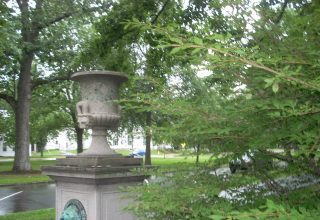
Spirituality as a Once Born or Twice Born Experience
I begin by turning to the wisdom offered by William James. He was the reason I accepted a Rockefeller Fellowship to attend Harvard Divinity School. I wanted to go where William James (1982/1990) hung out and wrote The Varieties of Religious Experience. In this remarkable book, James differentiated between those people who are “once born” and those who are “twice born.” The once born are people who seem, at least from my perspective, to be living on a single dimension. Their live tend to evolve in a straight (perhaps ascending) line. There are gradual evolutionary changes based on their personal life experiences as impacted by important external events surrounding their family, community, nation and world. I would consider myself to be one of those folks who are “once born.”
By contrast, those who are twice born seem, from my perspective, to be living on two or more dimensions. James offers accounts of twice born people who are impacted by some intrusive external event that has a spiritual source. The conversion of Saul to Paul in the New Testament offers a prominent example of the twice born life course. Something happens and nothing is ever the same again. This is revolutionary change and is sparked more by something that is very personal in nature—rather than coming primarily from some external, “real” event (such as is the case with once born evolutionary change and development).
The second or third or fourth “birth” can occur early in life or much later. Young people find “God” or “Jesus” during their formative years—and are converted to a life of faithful devotion to a specific set of beliefs and values. On the other hand, one can be reborn later in life, after facing major challenges that lead to a new belief or shifting priorities. One of the students in the graduate school where I served as president, had spent time during World War II as a British bombardier. He dropped bombs on Dresden, Germany and witnessed the devastating impact of this bombing (which was even more destructive than the atomic bombing of Hiroshima and Nagasaki). This devastation haunted him for many years, leading this long-time member of the armed forces in both England and the United States, to shift his priorities. He decided to get a doctorate at my graduate school so that he could treat the psychological wounds of children. All of this was a “reborn” desire on his part to somehow make up for his role as someone who bombed Dresden.
I have never endured the kind of trauma that led this man (and many other victims of war-induced stress) to change their life priorities and work. I am not twice born. However, I am deeply appreciative of the life experiences of those who share narratives regarding profound transformations—and I feel honored to have presided over an educational institution that assisted those who have been traumatized. In some ways I wish I was twice born and many of my evangelical colleagues believe that I will eventually encounter a spiritual force that brings about a conversion in my own life. At another level, however, I am skeptical about conversations—or perhaps I am frightened about the prospect of some major change in my now old and comfortable lifestyle.
Spirituality as a Numinous Experience
Many years ago, the noted religious scholar, Arthur Darby Nock (1933) observed that members of most societies over history either find spirituality all around them in nature or are born into a spiritual tradition. “There is no religious frontier to cross, no difficult decision to make . . .” (Nock, 1933, p. 5) These folks are inherently “first born” and find little reason or occasion to doubt their spiritual perspective. However, on occasion, there is the matter of confronting “the unseen and unknowable.” (Nock, 1933, p. 269). This can lead to James’ “twice-born” experience and to a conversion from one belief system and way of being in the world to another system and behavior pattern. I would suggest that the unseen and unknowable is often conveyed through a profound spiritual experience that Rudolph Otto and (a little later) Carl Jung, called the Numinous.
Download Article 1K Club


















